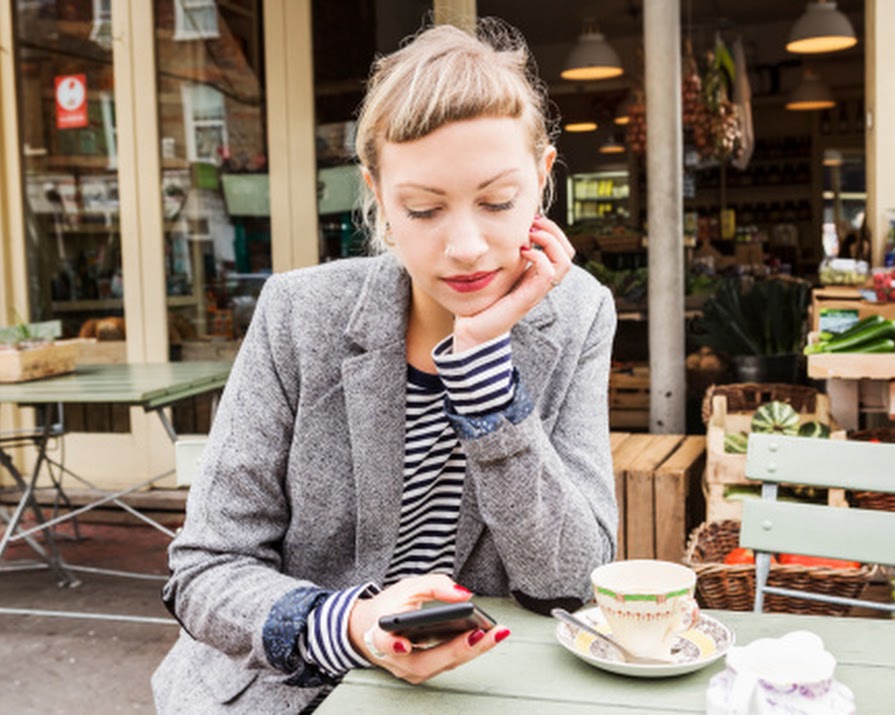
By IMAGE
09th Oct 2015
09th Oct 2015
Phubbing. It’s an epidemic issue. No scratch that, it’s PANDEMIC. You might not recognise the word, but you’ll certainly be familiar with it in practice. It’s when you’re snubbed by the person opposite you, whose head is buried in their phone. You’re ignored, only about half of what you say – or less – actually makes its way through their ears, and if it does, it’s in one and out the other. Whether your partner’s adding to their Snapchat story, scrolling Facebook endlessly for no good reason or obsessively refreshing their emails, it’s something that’s negatively affecting our relationships. Or maybe you’re the phubber.
On the back of new research, conducted by the University of Baylor in Texas, we’ve enlisted the wisdom of Dr Maeve Hurley, an expert on communication and relationship conflict and CEO of Ag Eisteacht charity. Hands up if you’ve been guilty of the following (don’t worry, we’re right there with you).
So, give us the correct definition of phubbing?
Phubbing is a term for ?phone snubbing? and according to a recent report by scientists at Baylor University in Texas, it can damage romantic relationships. They defined phubbing as the extent to which someone uses or is distracted by, their phone in the company of a partner.?There are some characteristics of phubbing, which include;
- Having the phone in sight while spending time together
- Glancing at the phone while engaged in conversation with their partner
- Having the phone out on the table during a typical meal-time
- Reaching for or using the phone where there is a lull in conversation
- Answering a call or text even if in the middle of a conversation
According to the report, almost half of those surveyed, 46%, reported being phubbed by their partner. Nearly a quarter said it had led to conflict in their relationship while well over a third said they felt depressed when experiencing this behaviour.
We are all guilty of some of this behaviour to a certain extent and, it can be easy to assume that phubbing is not that big of a deal and would not have an impact on a relationship. However, the results of this analysis showed that when one partner was engaged in this behaviour consistently, it led to an increase in dissatisfaction with the relationship for the person being phubbed. This ultimately can lead to serious relationship problems.
Is it an issue in Ireland?
There is every reason that phubbing is an issue in Ireland. We only need to look around us in cafes, bars and restaurants to see couples who are sitting in silence together but looking at their phones. Or, we might see a couple where one is staring into the distance while the other is concentrating on their phone, tablet or another mobile device. Of course we all take a quick look at our phones or answer a text message when we are in the company of a loved one. It’s when this focus on the phone becomes prolonged and one person is isolated despite the fact they are physically with their partner, that it becomes an issue.
There is also research to back this up. A 2013 Behaviour and Attitudes study in Ireland revealed that 1.6 million people owned smartphones. 250,000 of these owned up to checking work-related e-mails on holidays while 50% said they could not and would not switch off their phones in the evening and at weekends. These latter statistics, in particular, are a source of concern for me, as I can see huge potential for damage to relationships as a direct link to this.
How does it affect people?
The best relationships are based on communication and, in order to survive and thrive, they need communication to remain a consistent and reliable aspect of the relationship.
We are all so aware of the statistic that over 70 % of all communication is non-verbal, so much so that we have become numb to it. We need to reconsider this again in the context of the Baylor University findings that 36% of people experienced depression because of phubbing by their partner.
If 70% of communication is non-verbal, this means those who are phubbing are sending out very strong messages to their partners. Messages such as ?I’m distracted by my phone and I’m not fully present to you? or ?at this moment in time my phone is more important to me than what you have to say.?
The person at the other end of this behaviour may experience this as anxiety, insecurity and anger. They may feel unappreciated, unimportant and ultimately, wonder about the other person’s commitment to them and to the relationship. These thoughts and feelings can pave the way for increased dissatisfaction with their partner and with the relationship, in general, as outlined by the authors of this study.
Tell us about the measured effect on couples?
One of our basic human needs is to feel loved and secure and in adult life, the majority of us will seek a partner that meets these needs.?Protective factors that help build relationships and buffer then in tough times include;
- Affection
- Time spent together
- Expressing and sharing feelings and support for each other.
- These factors will be diluted by phubbing, so when it comes to the time in a couple’s relationship where they need these extra ?buffers?, they may find that there exists a very weak support structure. If we consider one of these ?buffers’
– spending time together – how possible is it to do this and be really present for each other if one person is engaged in phubbing?
It is an intrinsic part of any couple’s relationship to feel a sense of security. This ‘sense? that you are part of a secure relationship is not something tangible, but it is something that is present subconsciously on a daily basis, and is necessary to nurture real trust and love. My worry is that the characteristics of this phubbing behaviour will over time erode the security of a relationship.
There is also the danger that if a partner is checking their phone constantly and paying more attention to it than to their partner, it could be easily misinterpreted. Even if the phone activity is innocent in nature, it could lead to suspicion and jealousy for the other person. They may also convince themselves that their partner is no longer interested in them, which could de-stabilise a previously loving relationship.
Are men or women more guilty of this?
It is difficult to say whether men or women are more at fault. There has not been enough research on the relatively new phenomenon yet to inform us whether it is a predominantly male or female issue. The Behaviour and Attitudes study carried out in Ireland in 2013 revealed that more women than men owned smartphones. However, men were perceived to be more tech savvy than women. So it is difficult to say in the absence of more targeted research.
People might not take it seriously, but can it lead to a fracture in relationships?
To a lot of people, phubbing can appear to be a very minor irritation. However, it is important to bear in mind that a small annoyance like this can build up in the mind of the partner being phubbed and, become something much bigger that can be very detrimental to a relationship. It can develop into overall dissatisfaction with their partner and the relationship, or feelings of depression. All of which will damage the fibre of a relationship. It is true of course that for some couples, phubbing will be a solvable problem – as defined by Dr John Gottman, Executive Director of the Relationship Research Institute in the US. A solvable issue is one that is situational, that is, it is purely about a specific topic – in this case phubbing – and nothing deeper, and therefore a solution can be found and maintained. There will though be a lot of cases where phubbing will be, what Dr Gottman calls, a perpetual problem. This is one which is created because of fundamental personality differences or fundamental lifestyle needs. With a perpetual problem, what matters less is the solution and what is more important is the manner in which the issue is communicated and discussed. It is important to use humour and affection in these cases and this is explored in more depth in the next section.
How do you suggest we combat phubbing?
The first step in overcoming phubbing in a relationship is to raise the fact that is has become an issue for you. You need to talk about how you feel and, the emotions you experience when you perceive you are being phubbed. Explain gently that you feel upset, angry or rejected when your partner is constantly focused on their phone. It could be that they are genuinely unaware of what they are doing and, once aware of the issue will make an effort to break out of this behaviour cycle.
If your partner is not receptive to what you have to say and denies that they are guilty of this behaviour, then ensure that you in turn listen to them. It could be that they themselves are dissatisfied in the relationship, and this has manifested itself in their phubbing behaviour. It could be that they have an issue to raise with you, but have not been communicating and have instead been avoiding this by using their phone as an escape.
If this is the reason, then listen to them and take on-board what they have to say. Work together to reach a solution. For example, you could suggest that they can make an effort to leave their phone out of hand/out of sight when you are spending time together, while you will work on whatever may have been causing an issue for them. You can review this agreement again in two weeks or a month and talk about whether you are both feeling happier and more secure in the relationship.
It could be that you are the person who is phubbing – so try to accept and understand that it really can be upsetting for your partner. Make an effort to leave your phone out of sight and reach when having dinner together. If you are relaxing together on the couch or watching a film again, ensure the phone is put away for that hour or two. If you are in conversation with your partner and your phone beeps or rings, just ignore it and allow the conversation to conclude, before checking your phone.?Always remember that it’s important to introduce humour into a situation like this. Suggest a fun way of combatting the behaviour, for example, the next time you are out to dinner or drinks, put both of your phones in the middle of the table and the first person who checks their phone has to get the bill.?Affection is another good antidote to anxiety and upset. Put your arms around your partner, tell them how important they are to you, how much you look forward to spending time together and how you would like it to be just the two of you an evening, without the distraction of phones or other devices.
Ag Eisteacht is a registered Cork-based charity which runs courses for frontline workers in a parenting setting. Courses are titled How To Argue Better and are aimed at improving active communication and methods of managing conflict in relationships.























